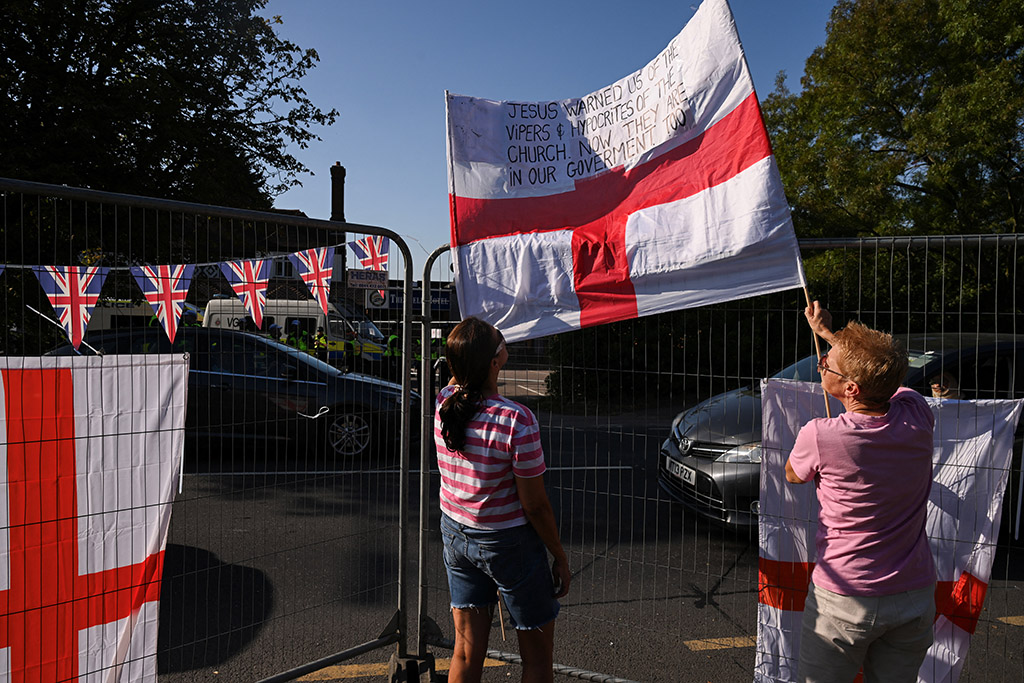If Cyprus has problems of identity so too does the UK
Flags and national anthems were in the news in UK and Cyprus lately in ways that caused mild but interesting controversy.
England’s national flag is the red cross of St George which serves to distinguish the English from the other nationalities of the United Kingdom and from other British citizens whose heritage is not from the British Isles.
Flying the England flag is not normally controversial. It is often displayed when England’s national football team – men’s and women’s – is playing. More controversially it is also used by far-right anti-immigrant groups as a nationalist symbol and, more recently, in protests around hotels housing asylum seekers to tell them they are not welcome in England when they arrive unlawfully in small boats and impose themselves as refugees.
English flag wavers are of course entitled to fly their flag in England in support of whatever cause they espouse, including that England is for the English and refugees and immigrants are not welcome, provided they do so peacefully – but they cannot hold up the flag of St George with one hand and set fire to hotels housing asylum seekers with the other.
The Greek national anthem is also not normally controversial among Greek Cypriots in the Republic of Cyprus (RoC). However, last week’s solo rendition of the Greek anthem at the EuroBasket 2025 match between Greece and Cyprus raised a few eyebrows amongst some Greek Cypriots that it smacked of old-style nationalism that puts off Turkish Cypriots whose support is essential to forestall the partition of Cyprus.
Old-style nationalism had lost much of its allure in the RoC because the nationalist military government of Greece 1967-74 had been thought responsible by many Greek Cypriots for the Turkish invasion and division of Cyprus in 1974. As for the Greek anthem’s effect on Turkish Cypriots, it is probably like water off the back of a duck since they too play the Turkish national anthem on similar occasions – neither side has a monopoly of nationalism in Cyprus.
The words of the Greek national anthem are the first three stanzas of a long poem by Greece’s national poet, Dionysios Solomos, titled a hymn to liberty set to music by Nikolaos Mantzaros. Both the poem and the music were inspired by the Greek war of independence of 1821 against the Ottoman Empire.
Like the French national anthem, La Marseillaise, the Greek anthem’s words are fierce and its music a catchy tune composed with an eye to popular participation. Hence, its best renditions have been choral with an orchestra or when sang spontaneously by a large collection of voices at mass gatherings like football matches.
The solo performance at EuroBasket 2025 was contrived and uninspiring with no crowd input. And another thing, if the idea behind an anthem is to inspire your national team to win, its effect is diluted somewhat if it is also the anthem of your opponent.
If Cyprus were ever to get it together again, my preference for its national anthem would be hrisoprasino fillo (gold green leaf) by Mikis Theodorakis with lyrics by Leonidas Malenis.
No provision was made in the 1960 constitution of Cyprus for a national anthem. The Greek national anthem was adopted in 1966 by an executive decision of the RoC Council of Ministers without Turkish Cypriot participation – the Cyprus problem was in full swing by then.
Cyprus does however have a national flag that imaginatively depicts its unique island shape as its national symbol – at the time the only country that wore its map on its flag. The map of Cyprus is in copper-orange against a white background over green crossed olive branches. Copper was the metal with which Cyprus was closely associated and from which its name derives. The Turkish side does not fly the Cyprus flag even though it was designed by a Turkish Cypriot artist and painter – the late Ismail Gunay.
In UK the official flag has been the union flag since 1801. It merges England’s red cross of St George and Ireland’s diagonal red cross of St Patrick with Scotland’s diagonal white cross of St Andrew against a blue background.
The Irish diagonal was retained after Ireland left the union in 1922 because Northern Ireland remained part of the UK. But the Welsh flag is not represented as it was part of the kingdom of England when the union flag was designed, which was convenient as its flag is a red dragon against a split white and green background that would not have been easy to incorporate into the union flag.
If Cyprus has problems of identity that spill over into its choice of national anthem, so does the UK owing to its union of four nations and the arrival of immigrants from the four corners of its old empire last century.
The UK’s national anthem is God save the King but there has been serious discussion about adopting the hymn Jerusalem by William Blake set to music by Hubert Parry – at least as England’s anthem. The words would suit England nicely, leaving God save the King for formal all British occasions and when the UK competes as Team GB.
Both the words and music of Jerusalem are more inspiring than the royal anthem. It ends with a rousing egalitarian message: “Nor shall my sword sleep in my hand till we have built Jerusalem in England’s green and pleasant land.”
Both the Scots and the Welsh sing their own anthems at sports events, but England and Northern Ireland play the UK anthem of God Save the King which, like Greece and Cyprus dilutes its purpose when they play against one another. Without wishing to step on Irish sensibilities the all-Irish song Danny Boy would make a great anthem for Northern Ireland.






Click here to change your cookie preferences